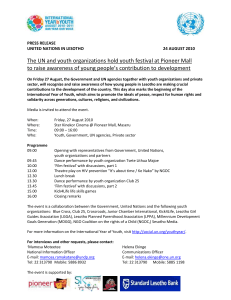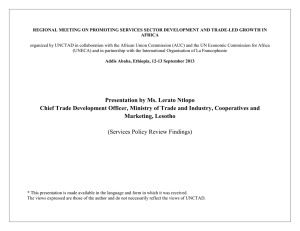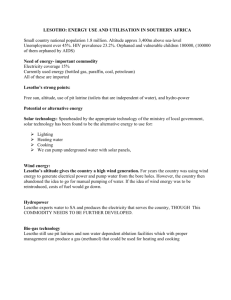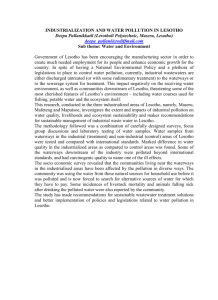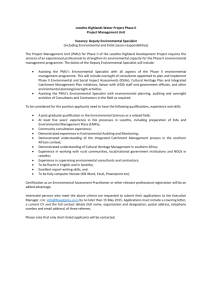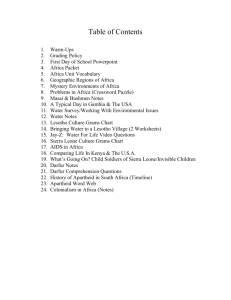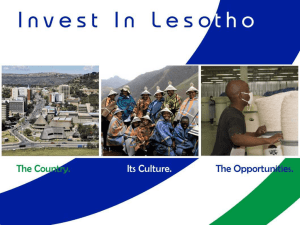REGIONAL MEETING ON PROMOTING SERVICES SECTOR DEVELOPMENT AND TRADE-LED GROWTH... AFRICA
advertisement
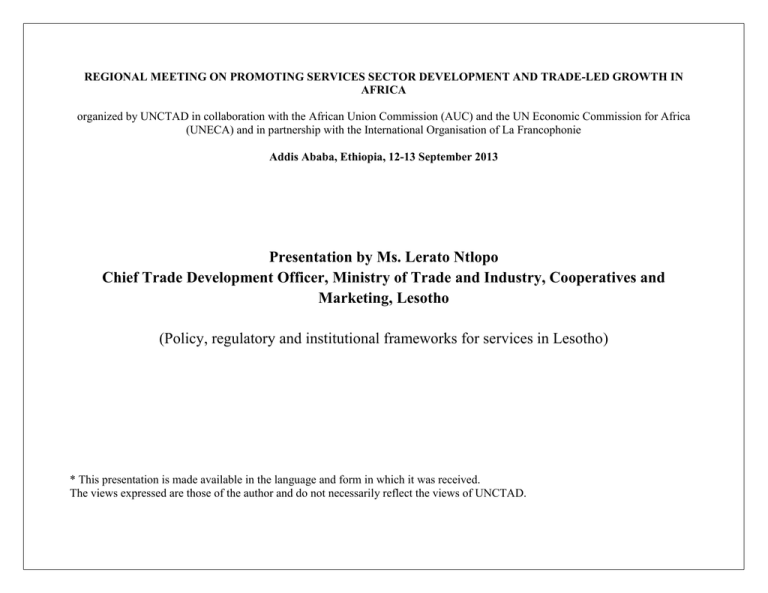
REGIONAL MEETING ON PROMOTING SERVICES SECTOR DEVELOPMENT AND TRADE-LED GROWTH IN AFRICA organized by UNCTAD in collaboration with the African Union Commission (AUC) and the UN Economic Commission for Africa (UNECA) and in partnership with the International Organisation of La Francophonie Addis Ababa, Ethiopia, 12-13 September 2013 Presentation by Ms. Lerato Ntlopo Chief Trade Development Officer, Ministry of Trade and Industry, Cooperatives and Marketing, Lesotho (Policy, regulatory and institutional frameworks for services in Lesotho) * This presentation is made available in the language and form in which it was received. The views expressed are those of the author and do not necessarily reflect the views of UNCTAD. Services Policy Review LESOTHO Session III Regional Meeting On Promoting Services Sector Development And Trade-led Growth In Africa Addis Ababa, Ethiopia - 12-13 September 2013 Presentation by Lerato Ntlopo Ministry of Trade and Industry, Cooperatives and Marketing Lesotho Presentation Overview Introduction Coordinating trade policies in Lesotho Challenges from diverse nature of services and web of institutions Lessons from SPR SPR Implementation Positive Steps towards implementation Conclusion Introduction • Given its intrinsic relationship with other economic activities, services trade provides a stable platform for increased economic efficiency which can contribute to or enhance Lesotho`s productive capacities and competitiveness • Services trade has immense potential in creating sustainable jobs and increased human development and provides opportunities for all types of businesses to thrive • The extend to which trade policy issues are coordinated at the national level determines the level of benefits a countries can enjoy Intro, cont…. National decisions on trade policy and related policies involve a range of public institutions, private sector and civil society organisations in order to ensure that services trade contributes to development. SPR - Performance of the services sectors is highly dependent on the quality of policies, regulations and institutions maximising positive contributions and pro-development outcomes of services trade requires good, credible and predictable policies, adequate regulations and strong institutions together with an enabling environment Coordinating trade policies in Lesotho Currently no specific services policy document – No consolidated Trade Policy Lesotho's Vision 2020 guides Lesotho’s long-term development plan The National Strategic Development Plan sets out the government’s strategic plan for promoting economic growth and reducing poverty Services are a key strategic component of Lesotho's development plan and the GoL has acknowledged the need to develop and strengthen the existing services sectors and support the expansion of new sectors Hence the SPR Coordinating trade policies in Lesotho cont.. Ministry of Trade and Industry, Cooperatives and Marketing is responsible for trade policy formulation As an international trade contact point Oversees that all services policies and laws/regulations are in compliance with multilateral rules, Recommends reform to comply with both Regional and Multilateral Agreements Participates in sectoral policy formulation and reviews Builds Synergies and Partnerships (depends on capacity) • Sectoral policies are driven by sector Regulators and Ministries responsible . Financial services – CBL, Ministry of Finance • Stakeholders: • Government Ministries and Agencies, • Private Sector, and • Civil Society Challenges from diverse nature of services and web of institutions Weak inter-Ministerial/ Agency coordination and dialogue continue to have significant negative effects on sector policies • Limited participation – Government, Private sector, Civil society • Lack of common understanding of country objectives • Lack of commitment and trust amongst stakeholders • Silo mentality • Uncoordinated efforts – national/regional initiatives • Relevance of the MTICM in ‘services’ Slow/NO implementation of policies or proposed legislative reforms MTICM is faced with upward struggle to influence critical economic policy issues such as liberalisation Lessons from SPR Promoting an enhanced holistic understanding of the services sector: Strengthening and sustaining policy formulation and implementation capacity within government institutions Mechanisms for information dissemination, and approach to coordinating policy-making across government: Constructive dialogue Continued consultations and consensus building Ensuring commitment to the reforms and full implementation A clear strategic goal on the role of private sector in the development of the services sector including participation in policy formulation Lessons from SPR Strengthen private sector associations to participate effectively in policy development and implementation Creating a balance between services liberalisation, reforms of legislation and regulations, strengthening regulatory institutions and creation of a competitive market to attract FDI as well as a competitive sector Formulation of a national services negotiating strategy as Lesotho’s trade liberalisation strategy should focus on securing access to other markets, as Lesotho’s market is already open to foreign services Plans for development a a competitive sector to take advantage of the negotiated markets Formulation of a services development strategy – Master plan Implementation SPR Recommendations Formulation of project/programme proposals Engagement of possible Regional/International Donors Implementation Positive Steps The government of Lesotho is working towards developing a strategic vision for the development of the services sector and services trade. SPR: ‘The aim of the strategy is to assume efforts to develop a comprehensive national system to capture trade in services, identification of institutional impediments, development of product and sector strategies, support for the services negotiating processes.’ The broad economic priorities and objectives for the services sector include increasing investment: upgrading and improving legal and institutional frameworks (particularly licensing procedures and the tax regime) developing key social services (health and education, including skills development and training) to promote a healthy and well-developed human resource base in Lesotho Draft Investment policy: The aim of the Government’s investment climate reform package is to remove a range of bottlenecks in order to make Lesotho a destination of choice for both domestic and foreign investors. Positive steps cont . . . The GoL emphasis is mainly to find means in which the services sector's overall performance can be enhanced in terms of strengthening the sector and improving national expertise within different sectors (TA/CB) development of services sectors such as the tourism industry are crucial in making the most of Lesotho’s comparative advantage in driving employment-creating growth MTICM is in the process of resuscitating the National Steering Committee whose main objectives include: To act as a focal point and an overseer of the‘coordination mechanism’for all trade related matters To enhance capacity of all relevant stakeholders to participate in policy formulation and implementation Conclusion Policies, regulatory and institutional frameworks, as well as strategies for services sector development are a vital element to the economic development of small states such as Lesotho National services sector development strategies should be developed through a greater coordination of cross- sectoral institutions for greater impact on services growth, with all key actors SPR – The multi-stakeholder process greatly contributed to enabling a holistic analysis of the priority sectors, Need to involve even more actors including donors partners move away from developing nicely packed documents which are not implemented. Kea lehoba Khotso, Pula, Nala !!! LERNTLOPO@GMAIL.COM


